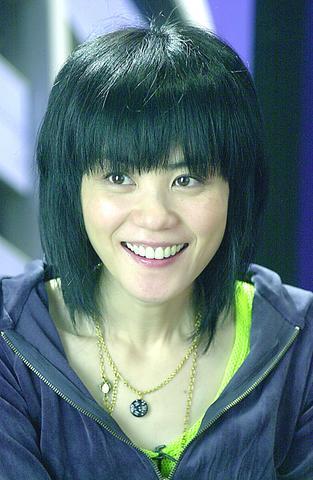When Faye Wong (
Sales figures in Taiwan are unreliable because it's an open secret that labels lie through their teeth about album sales, but Next Magazine (
Nothing seems to be going quite right for Faye, who arrived in Taipei from Hong Kong on Monday for a nine-day promotional tour. The highlight of her trip, which will take her to Taichung and Kaohsiung, was intended to be a meet-and-greet the fans session at the glitzy new Taipei 101 mall, but the bumbling managers of the shopping center somehow added a zero when telling Faye's agents the number of people the space could safely hold. So, Faye's managers who had planned for 2,000 fans were belatedly informed that the space could accommodate only 200. The mix-up forced Faye to switch venues for the event to the far-less glamorous Nankang 101 for this Saturday.

PHOTO: TAIPEI TIMES
Things also seem to be going from bad to worse for Momoko Tao(
TV show host and author Mickey Huang (
The pop event of the weekend, sure to be attended by every name in Mando-pop, will be David Tao's (

PHOTO: TAIPEI TIMES

Taiwan has next to no political engagement in Myanmar, either with the ruling military junta nor the dozens of armed groups who’ve in the last five years taken over around two-thirds of the nation’s territory in a sprawling, patchwork civil war. But early last month, the leader of one relatively minor Burmese revolutionary faction, General Nerdah Bomya, who is also an alleged war criminal, made a low key visit to Taipei, where he met with a member of President William Lai’s (賴清德) staff, a retired Taiwanese military official and several academics. “I feel like Taiwan is a good example of

March 2 to March 8 Gunfire rang out along the shore of the frontline island of Lieyu (烈嶼) on a foggy afternoon on March 7, 1987. By the time it was over, about 20 unarmed Vietnamese refugees — men, women, elderly and children — were dead. They were hastily buried, followed by decades of silence. Months later, opposition politicians and journalists tried to uncover what had happened, but conflicting accounts only deepened the confusion. One version suggested that government troops had mistakenly killed their own operatives attempting to return home from Vietnam. The military maintained that the

Before the last section of the round-the-island railway was electrified, one old blue train still chugged back and forth between Pingtung County’s Fangliao (枋寮) and Taitung (台東) stations once a day. It was so slow, was so hot (it had no air conditioning) and covered such a short distance, that the low fare still failed to attract many riders. This relic of the past was finally retired when the South Link Line was fully electrified on Dec. 23, 2020. A wave of nostalgia surrounded the termination of the Ordinary Train service, as these train carriages had been in use for decades

Lori Sepich smoked for years and sometimes skipped taking her blood pressure medicine. But she never thought she’d have a heart attack. The possibility “just wasn’t registering with me,” said the 64-year-old from Memphis, Tennessee, who suffered two of them 13 years apart. She’s far from alone. More than 60 million women in the US live with cardiovascular disease, which includes heart disease as well as stroke, heart failure and atrial fibrillation. And despite the myth that heart attacks mostly strike men, women are vulnerable too. Overall in the US, 1 in 5 women dies of cardiovascular disease each year, 37,000 of them